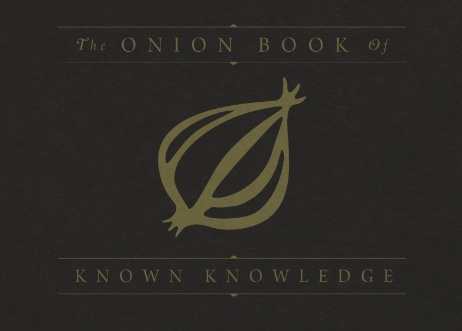Today the Onion released “The Onion Book of Known Knowledge,” a “definitive encyclopedia of existing information” condensed into 244 pages. Salon talked with the Onion’s editor Will Tracy via email about the release of the book, why comedy is hard and how the Onion has changed over the years. The interview has been abridged and edited.
How did you decide what to include?
Choosing entries for the book, and brainstorming “takes” for these entries, was a two-year process that, like the paper, was very much a war of attrition. We had a master list of entries we knew we had to have: God, Music, Literature, War, Abraham Lincoln, etc. The biggies. Everyone on staff, as well as some freelance contributors, poured in dozens, sometimes hundreds, of ideas for takes, and may the best idea win. Once we had a take idea nailed down for an entry topic, that entry would be assigned to a writer.
In addition to the big, must-have topics, we also wanted the book to be full of things that were completely left-field, or completely invented. A lot of people on the book staff, including the book’s lead editor, Joe Randazzo, are very skilled at this type of absurdism, and the book is chock-full of entirely imaginary animal species, public figures, locations and historical events.
And then we were also all delighted by the idea of writing entries on incredibly banal things, like an entry for “Table.” Or an entry for “Potato.” Suddenly, we were put in a position where, OK, the Onion has 200 words to tell the world what a table is. That challenge was pretty delightful. To sit down and write in a very definitive, serious voice, “A table is …” and then proceed to write 200 words of utter nonsense.
How does this book differ from earlier Onion books?
In the past two original books, we were somewhat limited by the overriding concept and were writing in a somewhat limited world — “Our Dumb Century” dealt with 20th century history, and “Our Dumb World” was primarily concerned with countries and geography. “The Onion Book of Known Knowledge” has no real limitations. If we wanted to write about World War 2, we could write about that. If we wanted to write about outer space, we could write about that, too. Or baseball. Or ducks. Or literally anything. And we could even do playful textual things, and drop the encyclopedia voice altogether at times. The entry on Mark Twain is written entirely in the voice and style of Mark Twain, for instance. So the possibilities were almost endless.

Headlines are starting to sound more and more like satire these days. Does that make an Onion writer’s job any harder, or have news and politics always been this absurd?
I don’t feel as though the news or the world itself has necessarily become more absurd than it was when the Onion started, there is simply more of it. Or rather, the act of covering the news never stops. And then there is the added absurdity of the news media industry itself floundering, at least in print and television. Twitter has complicated the equation, as it is a place where people can make quick, headline-length jokes about the culture, but I think our voice is immediately recognizable and different, and at the end of the day, our goal is not to make snarky comments about the news, but rather to make up the news entirely, and create our own original little world.

What headlines have gotten the most controversy lately? Do writers or editors feel like they ever need to hold back or fear being too offensive?
It’s safe to say we’ve had a few more controversial headlines lately than usual, although I think that is not so much a philosophical choice we made so much as we are now putting out more topical news coverage. Some that come to mind include “Sears Extremists Fly Plane Into Willis Tower,” “No One Murdered Because of this Image,” “Christian Bale Visits Sikh Temple Victims” and probably a few more I’m forgetting. No one shies away from writing jokes like this, but neither are we consciously trying to shock or provoke every time out. And I do think that the vast majority of our jokes can be defended on both satirical and ethical grounds. Oh, and legal grounds, too, thank heavens.

“This American Life” gave the world insight into the Onion’s writing process several years ago. How has it changed since then?
Creating the Onion has changed in certain ways, primarily we have moved to more of a daily production schedule where we are putting up new, timely, responsive content every day. We still do the same amount of “evergreen” content — stories that can run any time and still be relevant — but we have made an effort to make the Onion into a website that people feel compelled to check every day, not simply every week, or every once in a while. Those who do visit the Onion every day now will be rewarded for doing so, because we are watching the news like hawks, and striking with much greater frequency than before. That’s right. We’re hawk-people. Mutant hawk-people.

